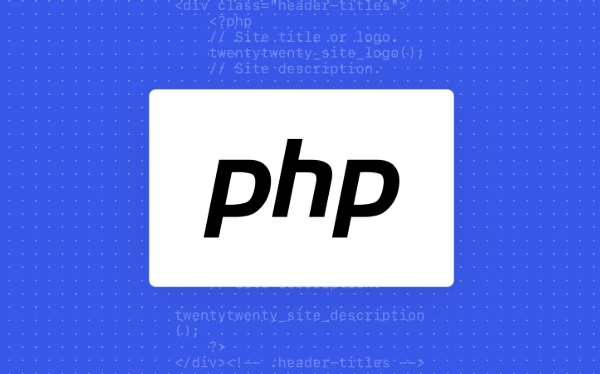 Backend Development
Backend Development
 PHP Tutorial
PHP Tutorial
 From `mixed` to `void`: A Practical Guide to PHP Return Type Declarations
From `mixed` to `void`: A Practical Guide to PHP Return Type Declarations
From `mixed` to `void`: A Practical Guide to PHP Return Type Declarations
Jul 27, 2025 am 12:11 AMReturn types in PHP improve code reliability and clarity by specifying what a function must return. 2. Use basic types like string, array, or DateTime to enforce correct return values and catch errors early. 3. Apply nullable types with ? (e.g., ?string) when null is a valid return value. 4. Use void for functions that perform actions without returning data, allowing only return; or no return statement. 5. Leverage union types (e.g., string|int|bool) in PHP 8.0 for functions returning multiple distinct types. 6. Prefer explicit return type declarations over implicit mixed to enhance IDE support and maintainability. 7. Avoid overusing union types and mixed, reserving mixed for cases where any type is genuinely expected. 8. Handle internal PHP functions carefully by aligning return types with their behavior, such as converting false to null for ?int. 9. Do not return null in void functions to prevent confusion, even though it is technically allowed. 10. Adopt return types progressively, starting with core logic and APIs, to make code more predictable and less error-prone while maintaining readability and intent.

PHP’s type system has evolved significantly since its early days, and return type declarations are a cornerstone of writing more predictable and maintainable code. If you've ever worked with loosely typed PHP functions—returning strings, arrays, or null without any clear contract—you’ve likely run into bugs that were hard to trace. That’s where return types come in.

Starting with PHP 7.0, you can now specify what a function should return, helping both the engine and your teammates understand your code’s intent. This guide walks you from using no types (mixed, though not always explicit) to embracing void, with practical examples and best practices.
Why Return Types Matter
Before diving into syntax, it’s worth understanding why return types help:

- Catch bugs early: Returning an array when you expect a string? PHP will throw a TypeError.
- Improve code readability: Anyone reading your function knows what to expect.
- Enable better IDE support: Autocompletion, refactoring, and inline docs become more accurate.
- Encourage intentional design: You think harder about what your function should return.
Without return types, everything is effectively mixed—a value of any type. While flexible, this leads to uncertainty. Return types let you narrow that down.
Basic Return Types: From Strings to Objects
You can declare return types for all common types:

function getUserName(): string {
return "Alice";
}
function getUserData(): array {
return ['name' => 'Alice', 'age' => 30];
}
function createDateTime(): DateTime {
return new DateTime();
}If you break the contract:
function getUserName(): string {
return null; // Fatal error: Return value must be of type string, null returned
}Unless you allow null explicitly using a nullable type:
function getUserName(): ?string {
return null; // This is now valid
}The ? prefix means “this type or null”.
When to Use void: Functions That Don’t Return Anything
Use void when a function performs an action but doesn’t return meaningful data—like logging, printing, or modifying state.
function logMessage(string $message): void {
file_put_contents('log.txt', $message . PHP_EOL, FILE_APPEND);
// No return statement needed
}Or with an explicit return;:
function abortIfNotAdmin(User $user): void {
if (!$user->isAdmin()) {
die('Access denied');
}
return; // Optional, but allowed
}Key rules for void:
- You cannot return a value:
return 5;→ Fatal error. return;with no value is allowed (same as not returning).nullis not a valid return value either.
This enforces the idea: “this function does something, but gives you nothing back.”
Handling Optional or Multiple Types with Union Types (PHP 8.0 )
Before PHP 8.0, you couldn’t express “this returns string or bool”. Now you can:
function findUser(int $id): ?User {
// returns User or null
}Even better with union types:
function processInput($input): string|int|bool {
if ($input === '') {
return false;
}
if (is_numeric($input)) {
return (int)$input;
}
return trim($input);
}This makes the return contract explicit instead of leaving it as an undocumented mixed.
? Tip: Avoid overusing union types. If a function returns too many types, consider whether it’s doing too much.
Common Pitfalls and Best Practices
Here are a few things to watch out for:
Don’t add types just for the sake of it
Start with critical functions (APIs, core logic), not every helper.Be careful with internal PHP functions
Some returnfalseon failure (e.g.,strpos()). Match expectations:function findPosition(string $haystack, string $needle): ?int { $pos = strpos($haystack, $needle); return $pos === false ? null : $pos; }Now the return type is
?int, which is clearer thanint|false.Use
mixedintentionally (PHP 8.0 )
If a function truly accepts or returns any type, usemixed:function debugPrint(mixed $value): void { var_dump($value); }This is better than no type hint at all.
Avoid
return null;invoidfunctions
While allowed, it can confuse readers. Omit thereturnunless you’re exiting early.- Use specific types (
string,array,User) when you know the return value. - Use
?Typewhennullis a valid response. - Use
voidfor side-effect-only functions. - Use union types (
string|int) when multiple types are expected. - Use
mixedsparingly and deliberately.
Summary
Moving from untyped (mixed by convention) to well-typed functions makes your PHP code more robust:
The goal isn’t to type everything to the maximum extent, but to make your code’s behavior clearer and less error-prone.
Basically: if your function promises a return type, make sure it keeps that promise. PHP will help you enforce it.
The above is the detailed content of From `mixed` to `void`: A Practical Guide to PHP Return Type Declarations. For more information, please follow other related articles on the PHP Chinese website!

Hot AI Tools

Undress AI Tool
Undress images for free

Undresser.AI Undress
AI-powered app for creating realistic nude photos

AI Clothes Remover
Online AI tool for removing clothes from photos.

Clothoff.io
AI clothes remover

Video Face Swap
Swap faces in any video effortlessly with our completely free AI face swap tool!

Hot Article

Hot Tools

Notepad++7.3.1
Easy-to-use and free code editor

SublimeText3 Chinese version
Chinese version, very easy to use

Zend Studio 13.0.1
Powerful PHP integrated development environment

Dreamweaver CS6
Visual web development tools

SublimeText3 Mac version
God-level code editing software (SublimeText3)
 Modernizing Your Codebase with PHP 8's Union Types
Jul 27, 2025 am 04:33 AM
Modernizing Your Codebase with PHP 8's Union Types
Jul 27, 2025 am 04:33 AM
UpgradePHP7.xcodebasestoPHP8 byreplacingPHPDoc-suggestedtypeslike@paramstring|intwithnativeuniontypessuchasstring|intforparametersandreturntypes,whichimprovestypesafetyandclarity;2.Applyuniontypestomixedinputparameters(e.g.,int|stringforIDs),nullable
 The Duality of PHP: Navigating Loose Typing vs. Strict Type Declarations
Jul 26, 2025 am 09:42 AM
The Duality of PHP: Navigating Loose Typing vs. Strict Type Declarations
Jul 26, 2025 am 09:42 AM
PHP supports the coexistence of loose types and strict types, which is the core feature of its evolution from scripting languages to modern programming languages. 1. Loose types are suitable for rapid prototyping, handling dynamic user input, or docking with external APIs, but there are problems such as risk of implicit type conversion, difficulty in debugging and weak tool support. 2. Strict type is enabled by declare(strict_types=1), which can detect errors in advance, improve code readability and IDE support, and is suitable for scenarios with high requirements for core business logic, team collaboration and data integrity. 3. Mixed use should be used in actual development: Strict types are enabled by default, loose types are used only when necessary at the input boundaries, and verification and type conversion are performed as soon as possible. 4. Recommended practices include using PHPSta
 PHP 8.1 Enums: A New Paradigm for Type-Safe Constants
Jul 28, 2025 am 04:43 AM
PHP 8.1 Enums: A New Paradigm for Type-Safe Constants
Jul 28, 2025 am 04:43 AM
Enums introduced in PHP8.1 provides a type-safe constant collection, solving the magic value problem; 1. Use enum to define fixed constants, such as Status::Draft, to ensure that only predefined values are available; 2. Bind enums to strings or integers through BackedEnums, and support conversion from() and tryFrom() between scalars and enums; 3. Enums can define methods and behaviors, such as color() and isEditable(), to enhance business logic encapsulation; 4. Applicable to static scenarios such as state and configuration, not for dynamic data; 5. It can implement the UnitEnum or BackedEnum interface for type constraints, improve code robustness and IDE support, and is
 Understanding the `callable` Pseudo-Type and Its Implementation
Jul 27, 2025 am 04:29 AM
Understanding the `callable` Pseudo-Type and Its Implementation
Jul 27, 2025 am 04:29 AM
AcallableinPHPisapseudo-typerepresentinganyvaluethatcanbeinvokedusingthe()operator,usedprimarilyforflexiblecodeincallbacksandhigher-orderfunctions;themainformsofcallablesare:1)namedfunctionslike'strlen',2)anonymousfunctions(closures),3)objectmethodsv
 The Perils of Precision: Handling Floating-Point Numbers in PHP
Jul 26, 2025 am 09:41 AM
The Perils of Precision: Handling Floating-Point Numbers in PHP
Jul 26, 2025 am 09:41 AM
0.1 0.2!==0.3inPHPduetobinaryfloating-pointprecisionlimitations,sodevelopersmustavoiddirectcomparisonsanduseepsilon-basedchecks,employBCMathorGMPforexactarithmetic,storecurrencyinintegerswhenpossible,formatoutputcarefully,andneverrelyonfloatprecision
 Resource Management in PHP: The Lifecycle of a `resource` Type
Jul 27, 2025 am 04:30 AM
Resource Management in PHP: The Lifecycle of a `resource` Type
Jul 27, 2025 am 04:30 AM
The life cycle of PHP resources is divided into three stages: 1. Resource creation, obtaining external system handles through functions such as fopen and curl_init; 2. Resource usage, passing resources to related functions for operation, PHP maps to the underlying system structure through resource ID; 3. Resource destruction, manually calling fclose, curl_close and other functions should be given priority to release resources to avoid relying on automatic garbage collection to prevent file descriptors from exhausting. Best practices include: always explicitly close resources, use try... finally ensure cleanup, prioritize objects such as PDO that supports __destruct, avoid global storage resources, and monitor active resources through get_resources()
 The Life of a Variable: PHP's Internal `zval` Structure Explained
Jul 27, 2025 am 03:47 AM
The Life of a Variable: PHP's Internal `zval` Structure Explained
Jul 27, 2025 am 03:47 AM
PHP uses zval structure to manage variables. The answer is: 1. zval contains values, types and metadata, with a size of 16 bytes; 2. When the type changes, only the union and type information need to be updated; 3. Complex types refer to structures with reference counts through pointers; 4. When assigning values, copy is used to optimize memory; 5. References make variables share the same zval; 6. Recycling references are processed by a special garbage collector. This explains the underlying mechanism of PHP variable behavior.
 Unraveling PHP's Type Juggling: A Guide to `==` vs. `===`
Jul 28, 2025 am 04:40 AM
Unraveling PHP's Type Juggling: A Guide to `==` vs. `===`
Jul 28, 2025 am 04:40 AM
==performsloosecomparisonwithtypejuggling,===checksbothvalueandtypestrictly;1."php"==0istruebecausenon-numericstringsconvertto0,2.emptystrings,null,false,and0arelooselyequal,3.scientificnotationlike"0e123"=="0e456"cancau





